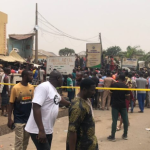
Authorities have confirmed a bomb explosion that killed at least five people and injured 15 others in Kano State, North West Nigeria, on Saturday, June 21, 2025.
The explosion in the Hotoro Eastern Bypass area near a metal company sent panic through the neighbourhood. Security and emergency response teams were quickly deployed to manage the situation and aid victims.
Kano State Commissioner of Police, Ibrahim Adamu Bakori, told journalists that preliminary findings suggest the explosion may have involved military-grade explosives in transit, not a terror attack.
“Preliminary findings suggest the explosive material was being transported by a trailer, but it remains unclear whether the vehicle was carrying military personnel or contractors,” he explained.
“I received an emergency call about a disturbing incident. Upon arrival, it appeared the explosion came from ordnance possibly being transported by military personnel,” Bakori said.
According to the commissioner, an initial investigation indicated that a large truck carrying explosive materials, reportedly headed toward Yobe State, might have been involved in the blast.
With regards to the casualties, he said 15 people sustained various degrees of injuries, while tragically, five have been confirmed dead. He says those injured have been taken to nearby hospitals for urgent medical attention.
“Security agencies are currently investigating the incident. The facts will be clearer once the investigation is completed,” the Commissioner said.
He also urged residents to remain calm as security agencies continue their investigation.
Meanwhile, photos show officers cordoning off the area and examining debris.
A painful history
Kano has a long and painful history with bomb explosions, many of them linked to Boko Haram’s violent campaign in Northern Nigeria. The city’s darkest day came on January 20, 2012, when coordinated attacks on police stations and government buildings killed over 185 people.
In the years that followed, bombings became frequent, especially in civilian areas like Sabon Gari, where explosions at motor parks in 2013 and 2014 claimed dozens of lives. The group’s use of female suicide bombers, including minors, created a new dimension of fear. Hospitals, markets, and schools were no longer safe.
Another devastating attack occurred in November 2014, when over 120 worshippers were killed at the Kano Central Mosque. Although military offensives have since pushed back the group’s operations, and urban attacks have declined, Kano has continued to face sporadic explosions from either suspected insurgent remnants or poor handling of explosives.
In May 2022, a blast in Sabon Gari killed several schoolchildren. Initial reports blamed terrorists, but authorities later said it resulted from the illegal storage of chemicals by welders. The incident and the recent one in Hotoro have exposed deep gaps in arms regulation and safety enforcement in civilian zones.
This latest explosion in Hotoro, which killed five people and injured 15, revives old fears. Although authorities have said they suspect the blast came from military-grade explosives being transported, the incident reflects Kano’s enduring vulnerability.
Extensive ungoverned forested areas in Kano State compromise security, serving as transit points for terrorist groups exploiting the complex landscape of northern Nigeria. Although Kano has historically been protected from widespread terrorism due to strategic military initiatives and its geographic advantages, recent incidents suggest a decline in safety. The local authorities’ inadequate communication and response during attacks heighten residents’ feelings of vulnerability and diminish their reliance on traditional security measures.
